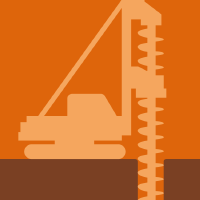Topic Editors


Advanced Risk Assessment in Geotechnical Engineering
Topic Information
Dear Colleagues,
Aim:
Risk assessment in geotechnical engineering is essential for the overall success of civil engineering projects, as it plays a fundamental role in ensuring their safety and reliability. Advanced risk assessment methods aim to enhance the understanding and mitigation of risks associated with the uncertain subsurface conditions, relevant for a range of geotechnical structures such as foundations, tunnels, foundation pits, retaining walls, reinforced soil, earthen structures (dams, levees), etc. A number of innovative and sophisticated methodologies and tools have been employed and developed in recent years, with the overall aim of assessing and managing the soil and rock-related uncertainties. Since the risk assessment in geotechnical engineering requires a multidisciplinary approach, this topic considers theoretical aspects and experimental work in domain of geology, hydrogeology, engineering-geology, geotechnics, civil engineering, environmental engineering, as well in other relevant branches of science. In addition to addressing the mentioned uncertainties in subsurface conditions, effective risk assessment ensures the safety of structures and human lives, helps in the identification and mitigation of geo-hazards, provides optimization in the design and construction of geotechnical structures, and ensures compliance with regulations and standards as well as long-term performance and sustainability.
Scope:
The scope of this topic includes a range of innovative aspects which could boost up practitioners' and researchers' awareness of risk assessment importance in geotechnical engineering. These aspects include the following:
- advanced methods for soil and rock characterization and subsurface data collection;
- advanced risk modelling and analysis with focus on probabilistic methods;
- geo-hazard identification and management;
- monitoring (with focus on advanced geotechnical and remote sensing methods) with development of early warning systems;
- identification and incorporation of climate and environmental factors into the risk assessment procedures;
- adherence to relevant industry standards, codes, and regulations in conducting risk assessments;
- development of risk-informed decision support tools for the relevant stakeholders in field of geotechnical engineering.
Prof. Dr. Meho-Saša Kovačević
Dr. Vassilis Marinos
Topic Editors
Keywords
- risk assessment
- risk modelling
- geohazards
- geotechnical engineering
- monitoring
- safety
- reliability
- uncertainties
- standards
Participating Journals
| Journal Name | Impact Factor | CiteScore | Launched Year | First Decision (median) | APC | |
|---|---|---|---|---|---|---|

GeoHazards
|
- | 2.6 | 2020 | 19 Days | CHF 1000 | Submit |

Geosciences
|
2.4 | 5.3 | 2011 | 23.5 Days | CHF 1800 | Submit |

Geotechnics
|
- | - | 2021 | 14.3 Days | CHF 1000 | Submit |

Remote Sensing
|
4.2 | 8.3 | 2009 | 23.9 Days | CHF 2700 | Submit |

Sensors
|
3.4 | 7.3 | 2001 | 18.6 Days | CHF 2600 | Submit |

Standards
|
- | - | 2021 | 30.6 Days | CHF 1000 | Submit |

Preprints.org is a multidisciplinary platform offering a preprint service designed to facilitate the early sharing of your research. It supports and empowers your research journey from the very beginning.
MDPI Topics is collaborating with Preprints.org and has established a direct connection between MDPI journals and the platform. Authors are encouraged to take advantage of this opportunity by posting their preprints at Preprints.org prior to publication:
- Share your research immediately: disseminate your ideas prior to publication and establish priority for your work.
- Safeguard your intellectual contribution: Protect your ideas with a time-stamped preprint that serves as proof of your research timeline.
- Boost visibility and impact: Increase the reach and influence of your research by making it accessible to a global audience.
- Gain early feedback: Receive valuable input and insights from peers before submitting to a journal.
- Ensure broad indexing: Web of Science (Preprint Citation Index), Google Scholar, Crossref, SHARE, PrePubMed, Scilit and Europe PMC.

